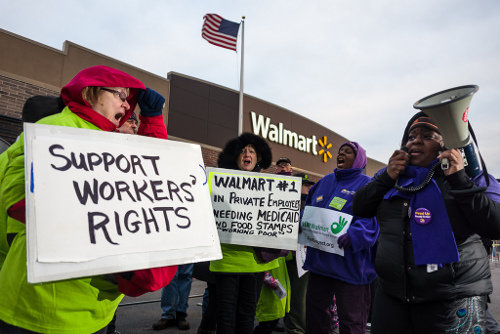
By Andi Sosin & Joel Sosinsky, Remember the Triangle Fire Coalition
NEW YORK CITY, NY—One day after “Black Friday,” when shoppers rushed to stores to buy holiday gifts and OUR WALMART rallied to raise salaries and increase full-time jobs with benefits across the US, a fire killed 112 apparel workers at Tazreen Fashion Ltd., a garment factory in Bangladesh that had no emergency exits. In an eerie similarity to the Triangle shirtwaist factory fire of 1911, many workers jumped to their deaths from the eighth floor to escape the flames. Three managers are accused of disregarding fire alarms and locking workers inside, where they were trapped by heavy smoke and suffocated or burned. Wal-Mart has disavowed implications of guilt for the fire because it had officially ceased using the Tazreen factory, although Wal-Mart’s private label clothing was found in the charred remains.
As Wal-Mart and its retail competitors seek the cheapest prices from dependent countries, they systematically contribute to the negligence of government officials and factory owners who cut corners on safety precautions. This fire was Bangladesh’s deadliest, but according to the International Labor Rights Forum, unsafe buildings and lax safety regulation enforcement have resulted in the deaths of approximately 700 Bangladeshi apparel workers since 2005, and of hundreds of other deaths in Pakistan and other cheap labor nations.
What connects the fire in Bangladesh to the Black Friday strike by US workers is Wal-Mart’s insistence on low prices at any cost. Despite its happy face rhetoric, Wal-Mart pays most of its US workforce minimum wage without health benefits or job security. It has fiercely fought off labor unions in the US and around the world. OUR WALMART’s Black Friday actions concentrated on improving conditions for Wal-Mart retail and warehouse workers in the US have been met with general public approval. While global labor solidarity is admittedly difficult to achieve in the current dire economic climate, commonalities between US workers and those elsewhere in the world are clear. Global solidarity among workers is the only way to reform labor practices in a power struggle with multi-national corporations. Bangladeshi workers are paid pennies in comparison with US workers, but their struggle for safe working conditions and living wages has consequences for workers in the US. As OUR WALMART gains public support it must consider lending its voice to support the struggles for safe workplaces undertaken by workers in Wal-Mart’s global supply chain, and not countenance a sordid and deadly race to the bottom.
The Remember the Triangle Fire Coalition regards the Triangle shirtwaist factory fire of 1911 as the prime motivator for today’s stringent workplace safety requirements and the progressive labor laws that created the US middle class. The lessons of the Triangle fire must not be forgotten at the peril of workers around the world. Designs for a Triangle Fire memorial are now being sought. For more information, visit rememberthetrianglefire.org.
